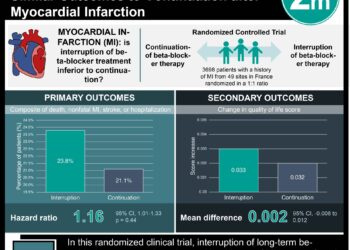No benefit with preoperative beta-blocker use in coronary bypass surgery
1. In a retrospective analysis of patients who had never had a myocardial infarction, preoperative b-blocker use was not associated with any difference in rates of mortality, stroke, ventilation durations, renal failure, or sternal wound infection.
2. Preoperative b-blocker use was associated with higher rates of new-onset atrial fibrillation.
Evidence Rating Level: 2 (Good)
Study Rundown: Retrospective analyses in the 1990s seemed to suggest benefits of preoperative b-blocker use. Preoperative b-blocker use in CABG patients has since become a quality standard in the UK, affecting the reimbursement levels of the hospitals and surgeons. However, more recent meta-analyses do not seem to reveal the same consistent benefits. In addition, the DECREASE family of trials has been delegitimized due to scientific misconduct.
The authors of this study only included nonemergency, isolated CABG patients and also excluded patients who had a myocardial infarction within 21 days of the operation. The study revealed that rates of operative mortality, permanent stroke, prolonged ventilation, reoperation, renal failure, deep sternal wound infection were similar among both groups. Interestingly, patients with preoperative b-blocker use had a significantly higher rate of new-onset postoperative atrial fibrillation. Strengths of the study include the large patient population included. Unfortunately, although b-blocker use for this purpose has become a very controversial topic, there have not been any large randomized prospective trials addressing this topic.
Click to read the study ,published today in JAMA Internal Medicine
Relevant Reading: Perioperative beta-blockers for preventing surgery-related mortality and morbidity: a systematic review and meta-analysis
In-Depth [retrospective cohort]: In this study, a retrospective analysis based on data in the Society of Thoracic Surgeons National Adult Cardiac database was performed. 506,110 patients who were older than 18 years of age, undergoing non-emergent CABG surgery and had not experienced a myocardial infarction in the prior 21 days met inclusion criteria.
Over 86% of patients had received b-blockers within 24 hours of surgery. No significant difference between the groups was found in rates of operative mortality (OR, 0.96 [95% CI, 0.87-1.06]), permanent stroke, prolonged ventilation, any reoperation, renal failure, or deep sternal wound infection. New-onset atrial fibrillation was higher in the group receiving preoperative b-blockers (OR, 1.09 [95% CI, 1.06-1.12]).
Image: PD
©2012-2014 2minutemedicine.com. All rights reserved. No works may be reproduced without expressed written consent from 2minutemedicine.com. Disclaimer: We present factual information directly from peer reviewed medical journals. No post should be construed as medical advice and is not intended as such by the authors, editors, staff or by 2minutemedicine.com. PLEASE SEE A HEALTHCARE PROVIDER IN YOUR AREA IF YOU SEEK MEDICAL ADVICE OF ANY SORT.






![Fibrinolysis for pulmonary embolism may prevent hemodynamic collapse [PEITHO trial]](https://www.2minutemedicine.com/wp-content/uploads/2014/04/762px-SaddlePE-75x75.png)